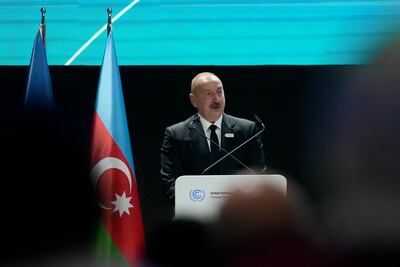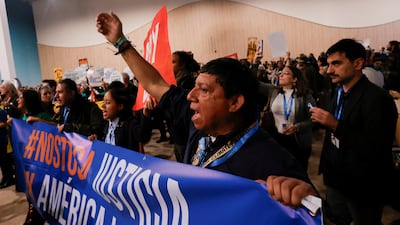Geopolitical tensions have rippled through Cop29, prompting climate campaigners to remind national leaders why they are in Baku.
Negotiations will resume on Monday – Sunday is a rest day – after the usually staid world of climate negotiations was rattled by a French minister cancelling her trip to the summit and Argentina withdrawing its delegation.
The French move came after Azerbaijan’s President Ilham Aliyev targeted France and the Netherlands over what he said was colonial rule. Mr Aliyev also used his speech during the World Climate Action Summit on Tuesday to criticise those who accused Azerbaijan of being a “petrostate”, and railed against the “hypocrisy” of the West.
Josep Borrell, the EU’s foreign policy chief, weighed in by stating on X that “these unacceptable statements risk to undermine the conference’s vital climate objectives”, prompting Hikmat Hajiyev, assistant to Azerbaijan’s president, to refute the remarks and state the “Cop process belongs to the UN and world”. He pledged that the Cop29 presidency would work constructively with all parties to deliver a good outcome.

Argentina's decision was not fully explained but its president, Javier Milei, is a climate sceptic. Along with the election of Donald Trump as US president-elect just before the summit, it has made for an interesting first week in Baku where countries are grappling with the hardest topic of all: money.
Azerbaijan, hosting arguably the most prestigious global gathering in its history, is drawing on its experience leading the Non-Aligned Movement from 2019 to 2024 and ultimately trying to showcase its geopolitical influence outside the West.
“It has built relationships with fellow developing producers, but also the most climate-vulnerable of countries,” Ruth Townend, senior research fellow at the Environment and Society Centre at Chatham House, told The National. “It is not unusual for Cop hosts to want to keep their friends close at such events.”
World away from the West
The summit has shed light on the sometimes strange and surreal world of meetings of the United Nations Framework Convention on Climate Change. A delegation from the Taliban wandered the halls during the first week and Russia, despite being sanctioned in the West, was drawing people to its prominent pavilion in the UNFCCC-managed “blue zone” for talks and events such as one on the future of its coal industry and climate.
Cop28 ended with a historic decision to “transition away” from fossil fuels. However, during his speech at the leader’s summit, the Azerbaijani President said his country was an advocate for the green transition but called for people to be “realistic” about it.
“It is this reframing of the event which is of most concern, rather than the presidency's encouragement of allies to attend,” said Ms Townend, who wrote Azerbaijan’s climate leadership challenge: what’s at stake at Cop29 and beyond for the think tank.
Several protests at the venue over the past week called for countries to act faster. Is the geopolitical backdrop playing a role?
“No, no, there's no political division,” Evans Njewa, chairman of the Least Developed Countries 45-country bloc, told The National. “I think we're moving together.”
No consensus means no agreement
Cop29 has one main task – to deliver more funds to those who need it most to fund the green transition. Drafts of the negotiating text – which would unlock funds for vulnerable countries on the front lines of climate change – have so far gone through several iterations with countries remaining far apart.
High-profile absences such as US President Joe Biden and China’s President Xi Jinping do not help the talks, with the diplomatic point-scoring further complicating the already tough job. These meetings work by consensus.
“Cop29, with its focus on climate finance, needs the major economies who have the responsibility and potential to mobilise this, to be in the room,” said Ms Townend.
A mixed reaction has greeted the call on Friday for reform of the Cop in a letter to the United Nations from a group that included former UN secretary general Ban Ki-moon. Negotiators from the small island states, for example, cautioned that they had a seat at the table at Cops – in contrast to the G20 which will meet in Brazil from November 18 to 19. The South American country also hosts Cop30 next year.
“We're not a part of those [G20] discussions,” said Michai Robertson, a negotiator for the Alliance of Small Island States. “So it is extremely important for forums like the UNFCCC to continue to exist.”
Despite the absences and withdrawals however, this could not be described as a forgotten Cop. Figures supplied by the UNFCCC show about 65,000 people have registered to attend.
Cop29 summit in Azerbaijan – in pictures
Defending the Paris deal
Toeolesulusulu Cedric Schuster, chairman of the Alliance of Small Island States, said they were here to “defend the Paris agreement” and ensure the goal of limiting global warming to 1.5C above pre-industrial levels was kept. Warming above this, scientists believe, could endanger the lives and livelihoods of countless people across the world.
This defence of previous goals rather than raising ambition to new ones has disappointed some climate campaigners. Zainab Bie, the Asia Pacific director of campaign group Equal Right, told The National that communities need to now lead the climate transition.
“We must seize this finance Cop as an opportunity to move beyond politics and focus on bold, people-centred solutions,” she said.
Hailey Campbell, co-executive director of the Care About Climate group, said Cop29 had gone from pushing for ambitious outcomes to “holding the line against backsliding”.
“Climate change doesn’t stop because of politics,” she said. “Parties must step back and remember we are here for a reason bigger than ourselves and our politics. We are here to tackle the greatest threat to our future and we need them to act like it.”
































